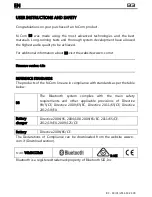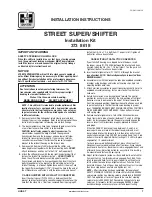
*
*
If you must drive the vehicle a short
distance in this condition, drive
slowly and cautiously.
If it comes on at any other time, it
indicates a problem with the vehicle’s
brake system. In most cases, the
problem is a low fluid level in the
brake fluid reservoir. Press lightly on
the brake pedal to see if it feels
normal. If it does, check the brake
fluid level the next time you stop at a
service station (see page
). If the
fluid level is low, take the vehicle to
your dealer and have the brake
system inspected for leaks or worn
brake pads.
However, if the brake pedal does not
feel normal, you should take
immediate action. Because of the
brake system’s dual-circuit design, a
problem in one part of the system
will still give you braking at two
wheels. You will feel the brake pedal
go down much farther before the
vehicle begins to slow down, and you
will have to press harder on the
pedal. The distance needed to stop
will be much longer.
Slow down by shifting to a lower
gear, and pull to the side of the road
when it is safe. Because of the
longer distance needed to stop, it is
hazardous to drive the vehicle. You
should have it towed, and repaired as
soon as possible. (See
on page
.)
The Brake System Indicator
normally comes on when you turn
the ignition switch ON (II). It is a
reminder to check the parking brake.
It comes on and stays lit if you do not
fully release the parking brake.
If the ABS indicator comes on with
this indicator, have the vehicle
inspected by your Honda dealer
immediately.
263
337
On models equipped with ABS
Emergency
Towing
Brake System Indicator
Taking Care of the Unexpected
329
BRAKE SYSTEM INDICATOR
U.S. indicator shown
02/07/24 15:13:56 31S9A610 0334
















































